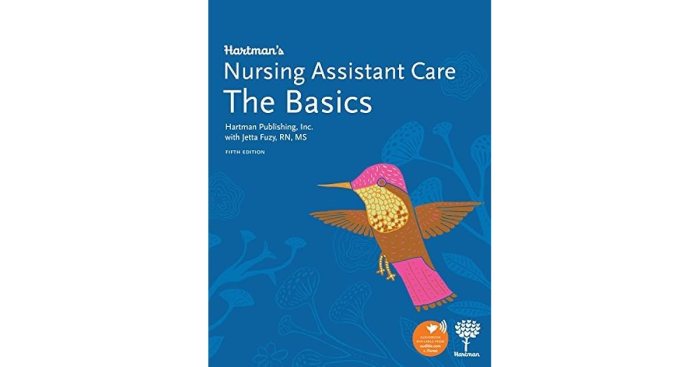Hartman’s nursing assistant care the basics workbook answers – Hartman’s Nursing Assistant Care: The Basics Workbook Answers provides a comprehensive guide to the essential knowledge and skills required for nursing assistants. This workbook offers a clear and concise overview of the responsibilities, techniques, and ethical considerations involved in providing quality patient care.
With its user-friendly format and engaging content, Hartman’s Nursing Assistant Care: The Basics Workbook Answers is an invaluable resource for aspiring and practicing nursing assistants seeking to enhance their knowledge and skills.
Nursing Assistant Responsibilities: Hartman’s Nursing Assistant Care The Basics Workbook Answers

Nursing assistants play a crucial role in healthcare settings by providing essential care and support to patients. Their primary duties include:
- Assisting with patient hygiene, including bathing, dressing, and grooming
- Providing assistance with feeding and hydration
- Monitoring vital signs and reporting changes
- Providing emotional support and companionship
- Maintaining a clean and safe environment for patients
Patient Care Techniques
Effective patient care involves employing a range of techniques to ensure the well-being and comfort of patients. These techniques include:
- Bathing: Maintaining proper hygiene by assisting patients with bathing, ensuring privacy and comfort.
- Dressing: Assisting patients with dressing and undressing, respecting their modesty and promoting independence.
- Feeding: Providing assistance with feeding, ensuring adequate nutrition and hydration, and monitoring for any difficulties.
Infection control is paramount in patient care. Nursing assistants must adhere to strict protocols to prevent the spread of infection, such as:
- Proper hand hygiene
- Using personal protective equipment (PPE)
- Maintaining a clean environment
Communication and Interpersonal Skills, Hartman’s nursing assistant care the basics workbook answers
Effective communication is essential for nursing assistants to build rapport with patients and their families. This includes:
- Active listening: Paying attention to patients’ needs and concerns
- Clear and concise communication: Using language that patients can understand
- Empathy: Understanding and responding to patients’ emotions
Nursing assistants may encounter challenging situations, such as patients who are agitated or uncooperative. It is important to remain calm and professional, and to seek assistance when necessary.
Legal and Ethical Considerations
Nursing assistants have legal and ethical responsibilities, including:
- Maintaining patient confidentiality
- Protecting patients from harm or neglect
- Respecting patients’ rights and dignity
In situations involving abuse or neglect, nursing assistants are obligated to report their concerns to the appropriate authorities.
Documentation and Reporting
Accurate and timely documentation is essential for patient care. Nursing assistants are responsible for:
- Documenting patient care and observations
- Reporting changes in patient condition
- Using appropriate medical terminology
Documentation serves as a legal record and helps ensure continuity of care.
Self-Care and Professional Development
Nursing assistants must prioritize their own well-being to provide effective care to patients. Self-care includes:
- Managing stress
- Maintaining physical and mental health
- Seeking support from colleagues and supervisors
Professional development is essential for career advancement and staying up-to-date on best practices. Nursing assistants can pursue:
- Continuing education courses
- Certification programs
- Mentorship opportunities
Essential Questionnaire
What are the primary duties of a nursing assistant?
Nursing assistants provide basic care to patients in healthcare settings, including bathing, dressing, feeding, and monitoring vital signs.
What are the key principles of infection control?
Infection control involves practices such as hand hygiene, proper use of personal protective equipment, and cleaning and disinfecting surfaces to prevent the spread of infection.
How can nursing assistants handle challenging patient situations?
Nursing assistants should approach challenging situations with empathy and professionalism, seeking support from supervisors or other healthcare professionals when necessary.

